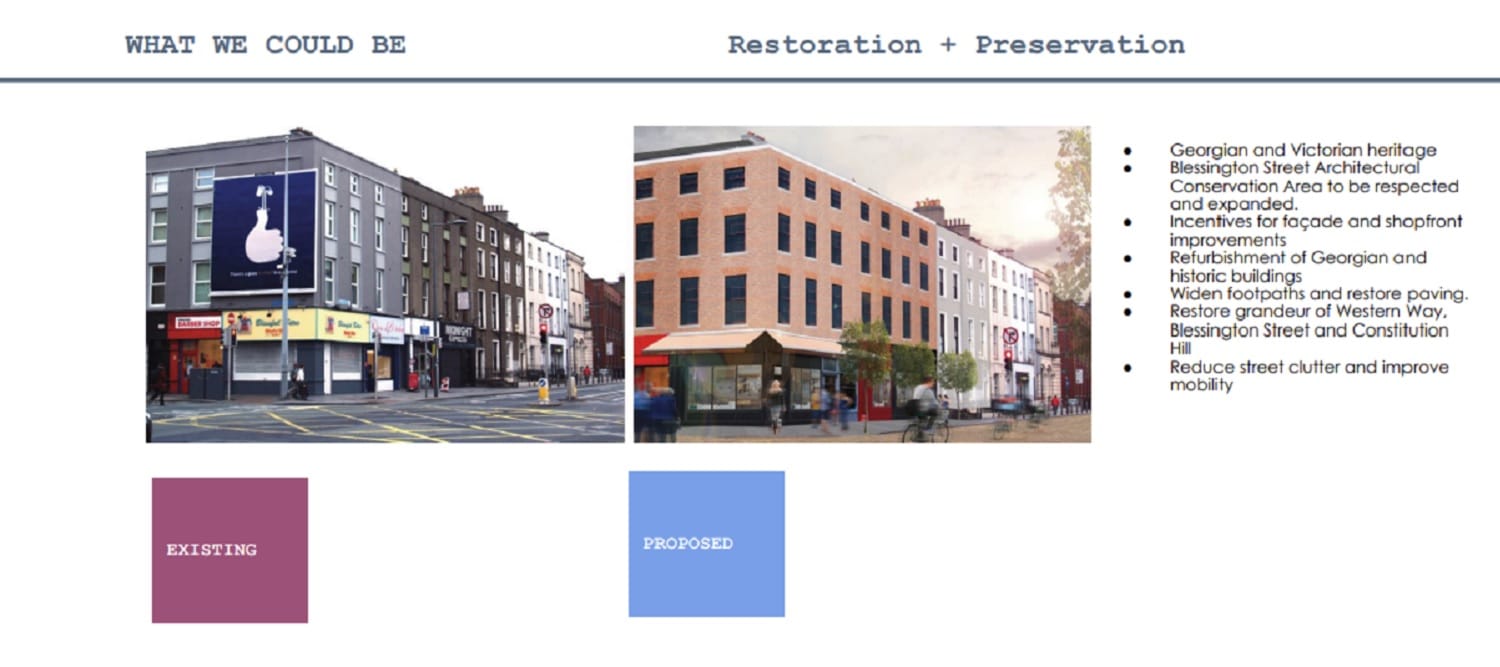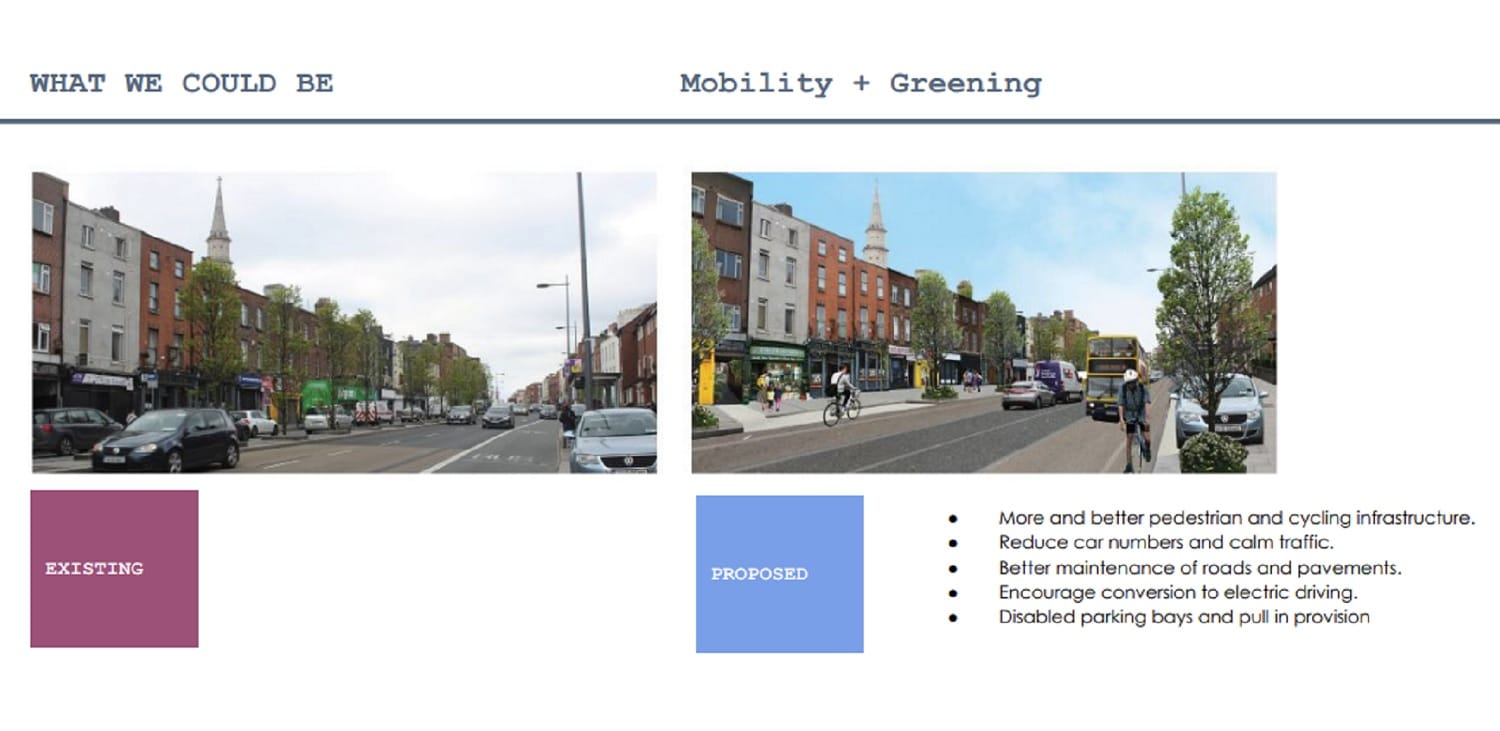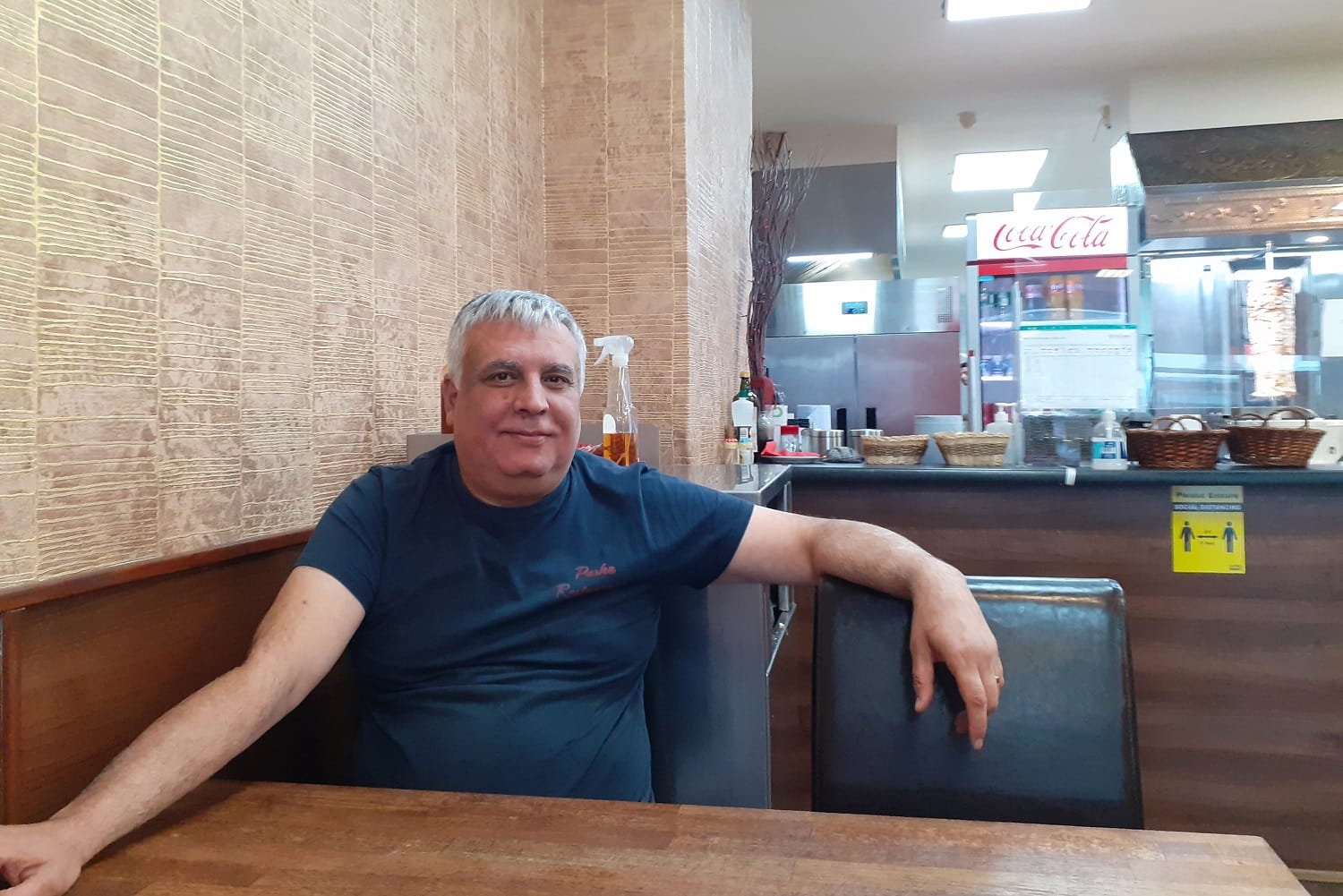To pay for amenities, Dublin City Council proposes levy on development of affordable housing
The change would make it more costly to deliver cost-rental and affordable-purchase homes for middle-income earners in Dublin.
Dorset Street Together won praise at a recent council committee meeting for bringing the local community together – but some immigrant businesses say they hadn’t heard anything about it.

In October 2018, some local residents and businesses around Dorset Street Lower teamed up with Dublin City Council to organise a pop-up shop that invited people in to say what the street should look like in the future.
On Tuesday, two of the organisers, Tom McKeon, who also runs the Old Music Shop Restaurant, and Tony Kelly, of the Lower Dorset Street Community Group, went before the council’s Central Area Committee to tell councillors what the group wants to do next.
The goal, McKeon said at the meeting, is for Dorset Street to become “a people-centred, fully rejuvenated definitive residential and commercial quarter”.
Some of the suggested changes are around traffic. For example, the group wants to remove the central median down the road to make space to widen the footpaths and cycle lanes, he said, showing slides of what its vision is.
Others, meanwhile, are about what’s on the street and what it looks like. The group wants to change how some of the buildings are used, turning them into apartments with terraces and vegetable gardens, and make the shop fronts look swankier and more uniform.
They’ve also submitted the proposals to be included in the next city development plan, the overall planning rulebook for the city, a new version of which will go out for public consultation soon, said McKeon.
The next step is for the proposals put forward by the Dorset Street Together Project to be discussed at other council committees, like the planning committee and the transport committee, said Karl Mitchell, a council officer at the meeting.
Ursula Donnellan, the council’s Central Area manager, said that the area office is also working with the group to help them navigate the council. “It can be tricky, as you know. We do our best to help from the area office perspective,” she said.
The group won praise at the council meeting for bringing the community together to produce the Dorset Street Together plan.
But still it’s not clear, as in the past, that everyone living and working along Dorset Street was represented: the group’s presentation listed the many takeaways on the street as one of the problems that needed to be addressed, and some of the people working in these immigrant-run businesses said this week they hadn’t yet been included in discussions about the plan.
At Tuesday’s meeting, McKeon pointed out the digital mock-ups of what the group’s ideas would look like implemented on the street, with the central median, which takes up the upper end of Dorset Street, removed.
Footpaths and junctions would be narrowed, a cycle lane installed, and planters for down the centre of the road, he said.
“You’ll see this lovely community bustle on the street – far, far greener, less traffic,” he says, of one picture that shows people walking on the footpaths.
“When there’s feet on the street, there’s always an extra few pounds being spent on the shops, in my opinion,” he said.
Janet Horner, a Green Party councillor, says she’d support the removal of the central median, for better pedestrian access.
When she’s getting her shopping on Dorset Street, near where she lives, she won’t cross the road, because it takes too long. “I won’t, and I never do, cross the street to pop into one of the shops on the far side, even though I might like to.”
She once timed her crossing, which took 6 or 7 minutes, she says. “It’s just not feasible. It’s not what an urban community should look like.”
There aren’t cycle lanes connecting Dorset Street with other streets, she says, or plans for it in Bus Connects, the National Transport Authority’s plan for a new bus network around the city.
“If you want to walk, cycle, for example, between Dorset street and Manor Street, there’s a big gap where the infrastructure just is just not going to be in place,” she says.
Eimer McCormack, a Fianna Fáil councillor, said “It looks amazing, the proposal. That’s what we want, we want urban villages and for everybody to use there, have a coffee on the street.”
Declan Meenagh, a Labour councillor, said he was “happy to support safe segregated cycle lanes, safe for everyone including pedestrians”.
There’s a lot of potential, but also I think there can be a lot of improvements, he said. “I would like to see more people live on the street and I’d like to see it revitalised.”


That was another plank of the group’s plan. McKeon pointed to what he said is the area’s transience, meaning the number of Airbnb-ed homes and the amount of student accommodation around Dorset Street.
The group wants to bring back over-the-shop living, and has drawn up plans that show how this accommodation would be incorporated into the street. (They didn’t say how much of that is already there.)
They also want there to be brick restoration, PVC windows changed to sash windows, “obstructive hanging signs removed”, and shop fronts made uniform with “simple lettering” and “correct proportions”.
There are regulation barriers, said Bláthnaid Conlon, senior staff officer for the council’s Central Area office, as some of the buildings are over 200 years old.
“They’ve gone through various iterations and all of them were giving something to the street,” she says.
“Now what’s happening is that, in many cases, people are prevented, cost-wise, to have the use and flexibility that those spaces would have in times gone by, they would have been letted as rooms,” she says.
The area office is hoping that building owners could go to a one-stop shop to sort out how to apply building regulations and when they don’t have to, she said. “Just that it could be done collectively instead of going through the normal processes.”
“It’s to make sure that they stay, and they’re sustainable. They’ve already hit their weight in gold in terms of carbon emissions. They’re there so long, it’s about keeping them there. They’re part of the fabric,” she says.
Yusuf Aydin, the manager of Pasha, a Turkish kebab restaurant and takeaway, said on Monday evening that he remembers the group saying they wanted to fix up the buildings along the street. “Fixing and painting, maybe cost twenty grand, but they only give them a couple grand.”
“I said yeah why not, if the area looks richer, the houses looks better. Yeah, why not,” he said, leaning his elbows on a table in his restaurant.
The plans were drafted by several residential groups and business associations in the area, with help from the council, McKeon said at the meeting.
There’s been huge support from the area, he says. “I’ve never before seen such wonderful support for a unification within our neighbourhood, as a neighbourhood and community.”
McKeon says that when the plan was first launched, there was big buy-in from the community. “At that point in time we had a number of submissions and buy-in from the rest of the community.”
Tony Kelly and McKeon, the organisers of the Dorset Street Together Project, did not respond to emails sent Tuesday afternoon about which Dorset Street businesses weighed in on the plans.
They also didn’t respond to queries on whether efforts, including overcoming language barriers, were made to engage immigrant-run businesses on the street – an issue that was raised at the time of the pop-up shop.
The group’s presentation lists “the potential” and “the problems” of the street.
Among “the potential” it includes “local business” with photos of the “award winning world-inspired plant based cuisine” restaurant Veginity, the coffee shop Tasty Options, and the grocers Tops in Pops and Eugeniu’s Butchers Shop.
Among the problems, it says, is a “lack of mixed-use”, which it illustrates with photos of takeaways – the New Victoria Chinese and Thai takeaway, the Spice n Rice Indian takeaway, and the Welcome City Chinese, and more, takeaway.
John Jiang, who runs Do-son, a Chinese takeaway on Dorset Street Lower, says he hasn’t heard of the Dorset Street Together group or the consultation around the street’s future.
He says he thinks it’s good that there’s lots of takeaways on the street. “I like that. It’s always better, you know.”
But, the traffic is bad, he says, because of commuters. “I don’t know, people go to the working in a lot of cars and you know, the bus, and the taxi.”
He’s not sure what to do about it though, he says. He thinks the Metrolink is a good solution. “I saw the news, the new line to the airport. But maybe it’s many many years later.”
On Friday, Aydin, the manager of Pasha, said he did hear from the people running the Dorset Street Together Project, but nothing came of it.
He went into the pop-up a couple of times, he says, and they discussed a meeting but it just didn’t happen.
“They didn’t ignore it, but they said they would talk to me. But then the pandemic came in and it didn’t happen,” he says.
“It’s not that they didn’t wanna do anything, they’d like to hear our ideas also, but I think the project wasn’t fully [done],” he said.
“I’m not blaming government or anything but maybe they were not prepared to listen to foreigners,” he says.

Next door, Mary Vu, who works behind the counter in Welcome City, says she also hasn’t heard of the plans. She agrees that traffic should be handled better on the street, though, she says.
Aydin says there isn’t as much support for immigrant businesses. “What I see in this country, population is growing. Multicultural,” he said. “Muslim population growing. They need halal food, they only eat halal.”
The government, and local people, should sit down with people of other nationalities to find out what they want, he said.
“They ask some of us, like I said, maybe I’m not wise enough to advise but I’m sure some people can tell us, about us, about Muslims, and Africans, about Polish and Romanians.”
Aydin suggests that the council give the project to him, to improve immigrant businesses. “I fix it. You see 10 million each year, 20 million next year tourists!”
It doesn’t have to be him, though, he says. “Maybe I’m not wise enough, but I’m sure they can find a wise Turkish man, Pakistani man, to meet with.”
At the council committee’s meeting on Tuesday, Cieran Perry, an independent councillor, praised the way different groups had worked together on the vision for Dorset Street being presented.
“I think this is a perfect example of the community, the local businesses and the local authority working together,” he said.
“For me, it appears to be a win-win-win, and I am surprised it hasn’t progressed any further,” he said.
Horner, the Green Party councillor, said that Dorset Street is a particularly diverse street, and that this should be particularly highlighted in future plans.
“There was concern in 2018 that I think some of those immigrant businesses were not being fully consulted or fully engaged in the plan,” she said.
She asked if there had been any progress since then, she said, “in terms of reaching out to those businesses and ensuring that there is full engagement and full participation and full support across the whole of the community in all its diversity for these ideas.”
“I would really hope that’s something that we can work on in how we bring these plans forward,” she said.
In the meeting, council officials and the presenters had time to respond to just a few of the questions that councillors had brought up – but Horner’s query wasn’t among them.